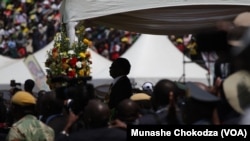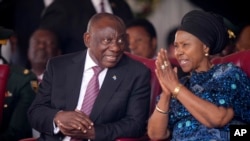Mnangagwa started his second term with promises to revive the southern African nation’s ailing economy while pleading for unity in the aftermath of the disputed Aug. 23 elections.
Speaking during his inauguration, Mnangagwa vowed to follow through on "responsive policies" that started during his first term, which he said were "on course to lift many out of poverty."
"I stand as president of all. I offer you individually and collectively, unity," he added.
Several African leaders, among them South African President Cyril Ramaphosa, Mozambique’s Phillipe Nyusi and Democratic Republic of Congo’s Felix Tshisekedi were in attendance of Mnangagwa’s ceremony.
Zambia’s president and chairperson of the regional SADC Organ on Politics, Defense and Security Cooperation, Hakainde Hichilema, was absent.
Hichilema's absence was noted after a preliminary report issued by the Southern African Development Community observer mission in Zimbabwe followed sentiments of other international missions which said the elections fell short of regional and international standards.
The Citizens Coalition for Change, CCC, Zimbabwe’s main opposition party, rejected Mnangagwa’s victory, arguing that the elections were "flawed" despite not challenging the outcome in court.
Nelson Chamisa, the CCC’s presidential candidate, took to social media site X, formerly known as Twitter, to express that his party is working to overturn Mnangagwa’s presidency, despite the inauguration and passing of a seven-day court challenge deadline.
"Thank you Africa and the world for standing with us Zimbabweans in dismissing fraud and stolen elections," posted Chamisa, adding, "together we will reverse this sham and have a legitimate government freely elected and enjoying the full will of all the people of Zimbabwe! It's not over."
Chamisa's CCC last week called for a re-run of the Aug. 23 polls, under the supervision of regional and international governing bodies, like SADC and the African Union.
Ibbo Mandaza, a member of the Southern African Political Economy Series, a Harare-based research focused non-profit organization differed with the CCC’s calls for an election re-run.
Mandaza told VOA that a re-run would be "futile" under the same political environment that has repetitively presented contested elections in Zimbabwe.
"There is need for (political) reforms in Zimbabwe," Mandaza said.
Mandaza called for a transitional government in Zimbabwe that would mainly comprise of the nation’s main political parties, ZANU PF and CCC, with the inclusion of smaller parties and civil society leaders.
"The major task of the transitional government would be to initiate a reform agenda on the political front, in particular to restore constitutionalism," he said.
Information for this article came from Reuters. VOA’s James Butty contributed.


Forum